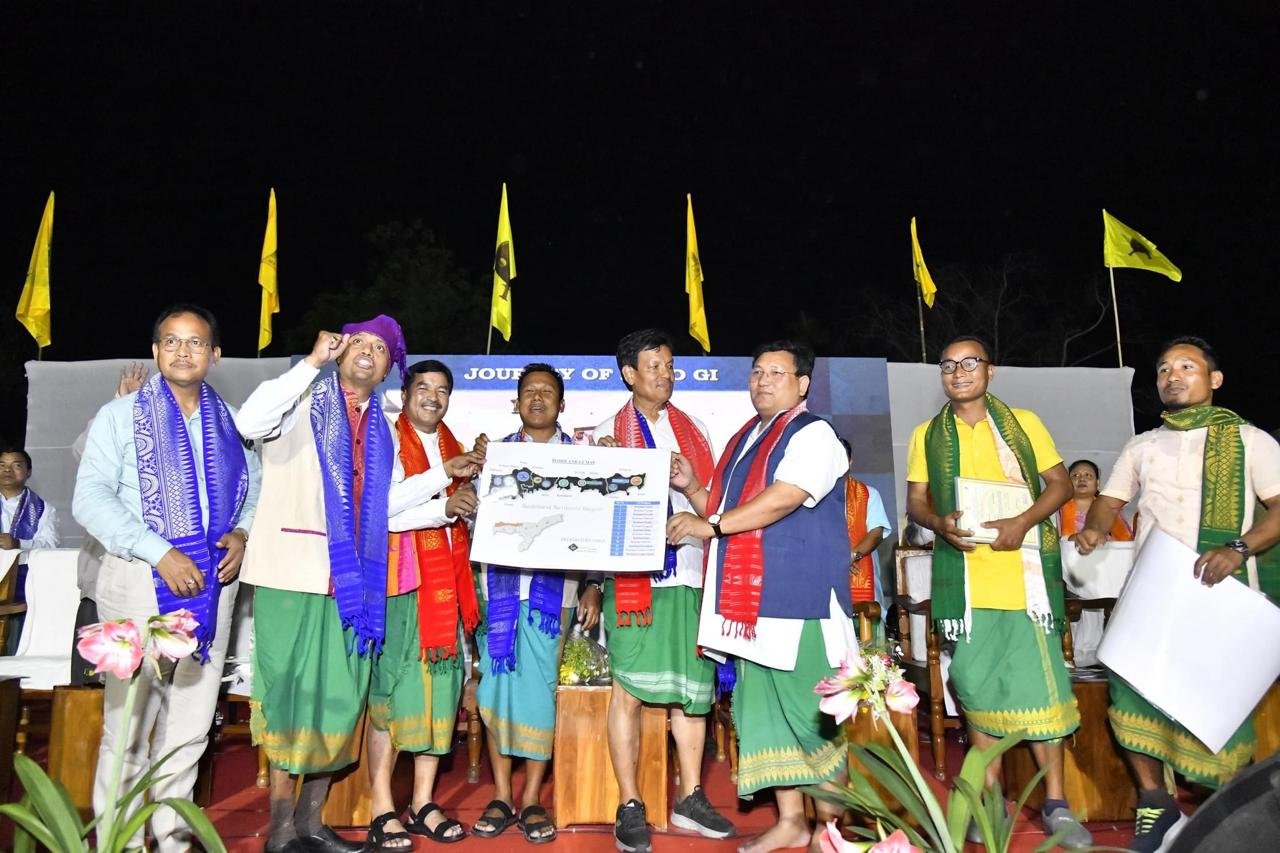HT Digital
Thursday, October 3: In a significant recognition of Assam’s rich cultural heritage, the Geographical Indications (GI) Registry in Chennai has awarded GI tags to eight unique products from the state. The products, ranging from traditional foods to distinct varieties of rice beer, highlight the deep-rooted customs and traditions of the region, particularly those of the Bodo community. The newly conferred GI tags serve as a mark of authenticity and cultural pride for Assam, providing legal protection to these items while showcasing their uniqueness to a broader audience.
One of the most notable aspects of the recognition is the inclusion of three traditional rice beers, which hold a special place in the Bodo culture. The Bodo Traditional Brewers Association played a key role in securing GI status for these beverages, which have been brewed for generations. Among them is ‘Bodo Jou Gwran,’ a rice beer with the highest alcohol content among the three, boasting an impressive 16.11% alcohol level. This strong rice beer is not just a drink but a symbol of the Bodo people’s ancient brewing techniques and their connection to nature.
Another rice beer that received the GI tag is ‘Maibra Jou Bidwi’ (also known as ‘Maibra Jwu Bidwi’ or ‘Maibra Zwu Bidwi’). This beverage is a popular welcome drink within Bodo tribes and holds cultural significance during celebrations and gatherings. It is made by fermenting half-cooked rice with minimal water and using a yeast-like substance called ‘amao.’ The process of brewing this rice beer has been passed down through generations, preserving the traditional methods and customs associated with it.
The third variety, ‘Bodo Jou Gishi,’ is another rice-based alcoholic beverage that has deep historical roots in the Bodo community. The application for its GI tag emphasized the long-standing role of rice beer in Bodo culture, noting that its origins are tied to ancient legends, including stories involving Lord Shiva. Historically, this rice beer was also administered as a form of medicine, further highlighting its cultural and practical importance. The GI tags for these three rice beers not only protect their heritage but also recognize their significance as part of Assam’s intangible cultural legacy.
In addition to the rice beers, four other traditional food products from Assam were also honored with GI tags. Among them is ‘Bodo Napham,’ a beloved dish made from fermented fish. This dish holds a special place in the Bodo diet and is prepared using traditional preservation methods. The fish is kept in air-tight containers for two to three months, undergoing fermentation—a method preferred by the Bodo people due to the region’s heavy rainfall and frequent flooding, which limits the availability of fresh fish year-round. Fermentation, along with smoking, drying, salting, and marinating, is one of the time-honored techniques used by the Bodo community to preserve their food.
Another traditional dish that received recognition is ‘Bodo Ondla,’ a flavorful curry made from rice powder and seasoned with garlic, ginger, salt, and alkali. This simple yet nourishing dish has been a staple in Bodo households for generations and is known for its distinctive taste and texture. The GI tag for Bodo Ondla helps preserve its legacy as a vital part of Assam’s culinary traditions.
‘Bodo Gwkha,’ also referred to as ‘Gwka Gwkhi,’ is another dish that now holds the prestigious GI status. This dish is traditionally prepared during the Bwisagu festival, a major celebration for the Bodo community. The recognition of Bodo Gwkha not only highlights the importance of this dish but also the cultural significance of Bwisagu, a festival that brings together food, music, dance, and rituals to celebrate the arrival of the new year.
Finally, ‘Bodo Narzi,’ a semi-fermented food made from jute leaves, has also earned a GI tag. This dish is known for its rich nutritional content, particularly its high levels of Omega-3 fatty acids, vitamins, calcium, and magnesium. The use of jute leaves in Bodo cuisine reflects the community’s deep connection to nature and their use of locally available resources in creating healthy and nutritious dishes.
In addition to the traditional foods and beverages, the GI Registry also awarded a tag to ‘Bodo Aronai,’ a handwoven cloth that holds great cultural significance for the Bodo people. Bodo Aronai is a narrow piece of cloth, typically 1.5 to 2.5 meters in length and 0.5 meters in width, and is worn around the neck during various ceremonies and celebrations. The cloth features intricate designs inspired by nature, with motifs such as trees, flowers, mountains, and birds. The artistry and craftsmanship involved in creating Bodo Aronai are a testament to the Bodo people’s rich weaving traditions, which have been passed down through generations.
The recognition of these eight products through the GI tags is a proud moment for Assam and the Bodo community, in particular. It highlights the importance of preserving traditional knowledge, practices, and products that have shaped the identity of the region for centuries. The GI tags not only protect these items from imitation but also open up opportunities for greater economic and cultural recognition, both within India and internationally.
As Assam celebrates this achievement, there is hope that these products will gain more widespread appreciation and that the GI tags will help promote sustainable development in the region. By protecting and promoting its traditional foods, beverages, and handicrafts, Assam is ensuring that its cultural heritage continues to thrive for future generations.







